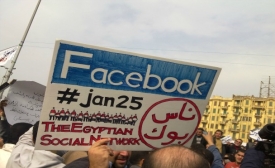tunisia
The demise of autocratic regimes, first in Tunisia and right after in Egypt, has triggered a broad debate that centers on the following question: Is the coming regime in Egypt, which carries a central importance for the Arab world, likely to resemble Turkey, or Iran?
Spain is closer to the Arab world than any other European country, but it has no better response than the rest of the EU.
The end of the Mubarak regime demonstrates the falsity of commonly held stereotypes: Arabs reject democracy, Islam is incompatible with popular sovereignty, the grip of rulers of security states is unshakable.

The USC Center on Public Diplomacy and the USC Annenberg Center on Communication Leadership & Policy were pleased to co-host a round-table discussion about the media and Middle East Turmoil. News and social media played a crucial role as revolution sweeps through much of the Arab world.
UK Foreign Secretary William Hague has visited Tunisia as part of a tour of North African and Middle Eastern states affected by calls for political change.
Egypt's revolution has been reverberating throughout the Middle East and North Africa, terrifying every dictator and authoritarian ruler, from those of Jordan, Yemen, and Saudi Arabia to Algeria and beyond.
Those who said that 'winds of change' were blowing through the Middle East were right. The past few weeks have seen a stunning series of political shifts in response to widespread discontent and popular opposition that once went unacknowledged.
As the number of young people in South Africa increases and access to the Internet improves, so too will access to the kind of resistance we’re witnessing in Egypt and Tunisia, writes guest blogger Khadija Patel.







